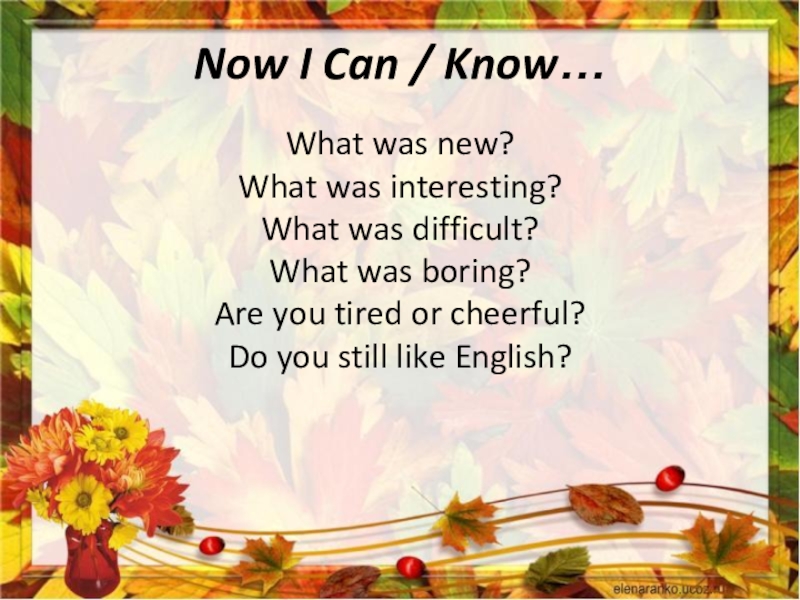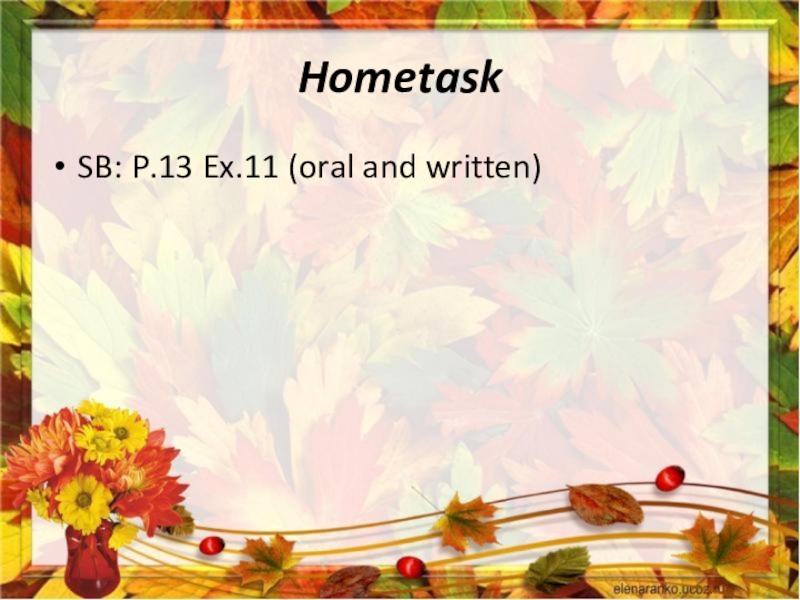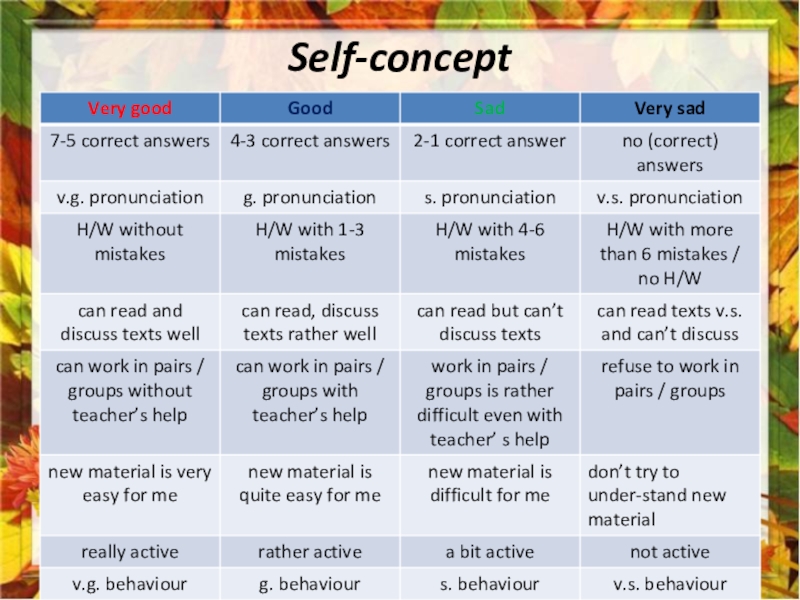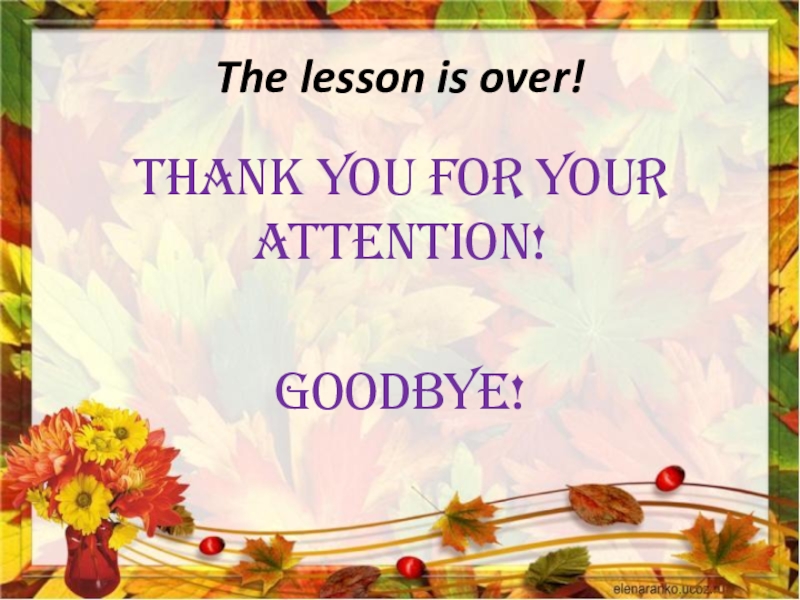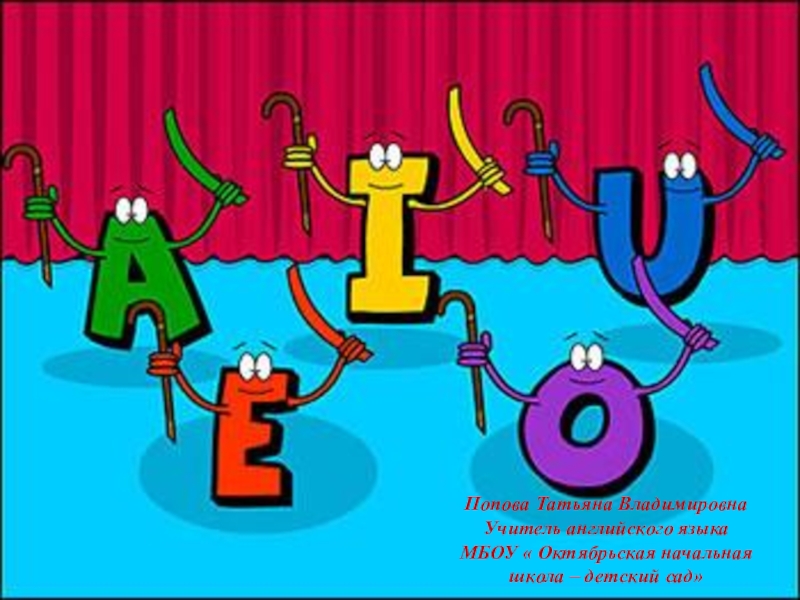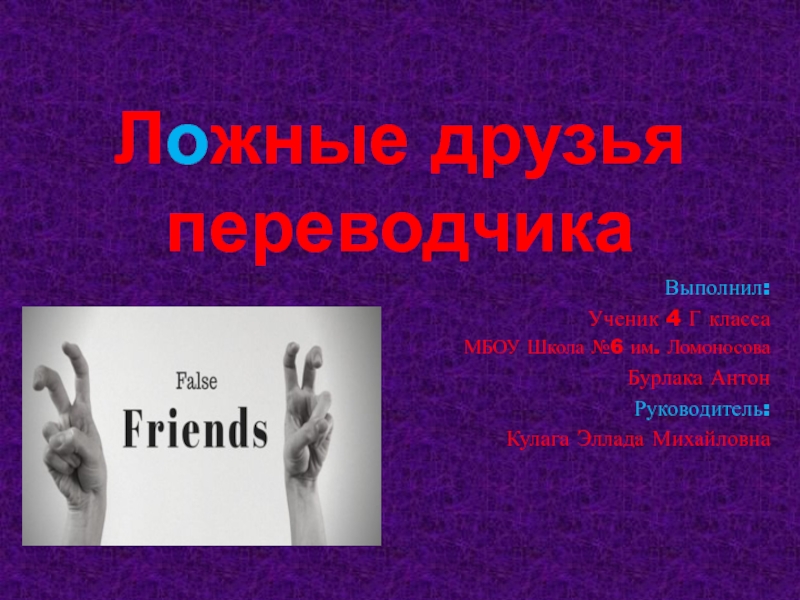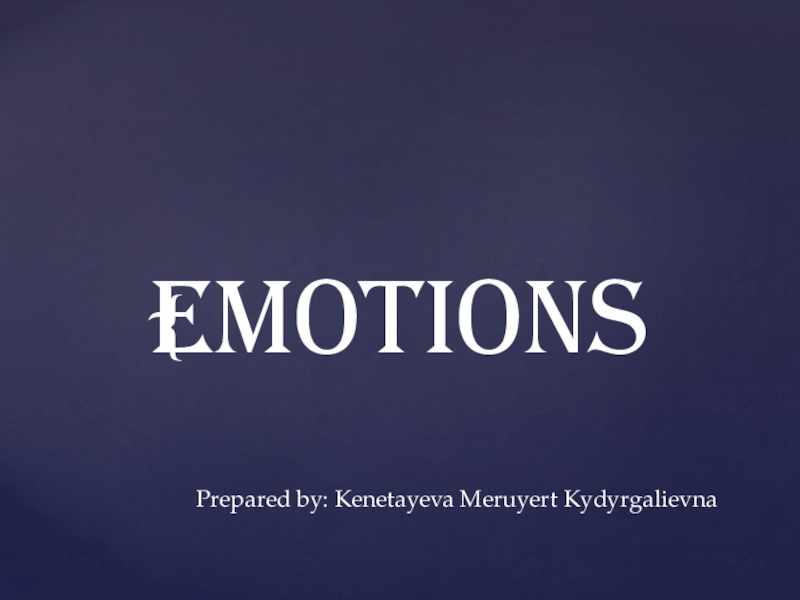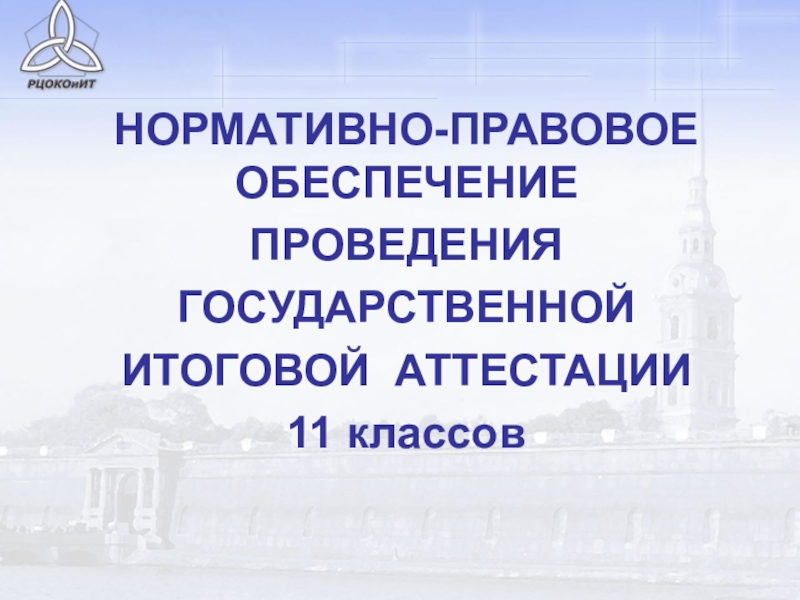Nadezhda Anatolyevna
- Главная
- Разное
- Образование
- Спорт
- Естествознание
- Природоведение
- Религиоведение
- Французский язык
- Черчение
- Английский язык
- Астрономия
- Алгебра
- Биология
- География
- Геометрия
- Детские презентации
- Информатика
- История
- Литература
- Математика
- Музыка
- МХК
- Немецкий язык
- ОБЖ
- Обществознание
- Окружающий мир
- Педагогика
- Русский язык
- Технология
- Физика
- Философия
- Химия
- Шаблоны, фоны, картинки для презентаций
- Экология
- Экономика
Презентация, доклад по английскому языку на тему Выражение беспокойства из-за примет/ предрассудков для 9 класса
Содержание
- 1. Презентация по английскому языку на тему Выражение беспокойства из-за примет/ предрассудков для 9 класса
- 2. Warm up!Answer my questions, please!What happened on
- 3. Warm up!What do you feel reading/ hearing
- 4. English tongue twister Listen to the tongue
- 5. English tongue twister Practise saying it. How
- 6. Let’s check your homework! 1. Mark the
- 7. Action time!Hands up,Hands down,Hands on knees, Sit
- 8. The main lesson aim: Expressing concern/worry
- 9. New materialVocabularydictionary entry [‘dikʃənəri ‚entri] – словарная
- 10. Now I Can / Know…What was new?
- 11. HometaskSB: P.13 Ex.11 (oral and written)
- 12. Self-concept
- 13. The lesson is over!Thank you for your attention!GoodbyE!
Warm up!Answer my questions, please!What happened on the 11th September, 2001?The terrorist attacks on the 11th September, 2001 were a series of four coordinated suicide terrorist acts committed in the United States by the members of
Слайд 1Spotlight 9
English Lesson 4
September 11th , 2018
Tuesday
Module 1 - Celebrations
Teacher: Smertina
Слайд 2Warm up!
Answer my questions, please!
What happened on the 11th September, 2001?
The
terrorist attacks on the 11th September, 2001 were a series of four coordinated suicide terrorist acts committed in the United States by the members of the terrorist organization "al-Qaeda". In the morning of that day four groups of terrorists with a total number of 19 people, captured four scheduled passenger airliners. Each group had at least one member who had past the initial flight training. The invaders sent two of the planes into the towers of the World Trade Center, located in the southern part of Manhattan in New York. American Airlines flight 11 crashed into the WTC-1 (North), and United Airlines flight 175 into WTC-2 (South). As a result, both towers collapsed, causing severe destruction of adjacent buildings. The third plane (flight 77 American Airlines) was sent to the Pentagon, located near Washington. The passengers and aircrew of the fourth airliner (flight 93 United Airlines) tried to seize control of the plane from terrorists, the plane crashed in a field near the borough of Shanksville in Pennsylvania. In addition to the 19 terrorists 2977 persons were killed in attacks, another 24 were missing. Most of the victims were civilians. The attack was the largest in the world history regarding the number of victims.
Слайд 3Warm up!
What do you feel reading/ hearing about such tragic event?
I
sympathize with the victims and their relatives. I’m angry with terrorists, they mustn’t kill people. I’m afraid that something similar can happen to me or my relatives. I’m worried about our future.
What should people around the world do to prevent terrorism?
All countries should live together in piece with one another to have possibility to stand against the common terror threat. We must pay attention in public spaces (public transport, cinemas, theatres, supermarkets, even in schools) to suspicious things and persons and contact police immediately. We must study health and safety rules very well. We have to learn foreign languages (English) to understand enemies.
Do English tongue twisters* help to learn this language?
*tongue twister [‘tʌŋ‚twɪstə] - скороговорка
What should people around the world do to prevent terrorism?
All countries should live together in piece with one another to have possibility to stand against the common terror threat. We must pay attention in public spaces (public transport, cinemas, theatres, supermarkets, even in schools) to suspicious things and persons and contact police immediately. We must study health and safety rules very well. We have to learn foreign languages (English) to understand enemies.
Do English tongue twisters* help to learn this language?
*tongue twister [‘tʌŋ‚twɪstə] - скороговорка
Слайд 4English tongue twister
Listen to the tongue twister !
Hassock hassock, black
spotted hassock. Black spot on a black back of a black spotted hassock.
Подушечка, подушечка, черная пятнистая подушечка. Черное пятно на черной поверхности черной пятнистой подушечки.
Подушечка, подушечка, черная пятнистая подушечка. Черное пятно на черной поверхности черной пятнистой подушечки.
Слайд 5English tongue twister
Practise saying it. How fast can you say
it?
Hassock hassock, black spotted hassock.
[‘hæsək ‚hæsək ‘blæk spɒtid ‚hæsək↘]
Black spot on a black back of a black spotted hassock.
[‘blæk ‚spɒt ɒn ə ‘blæk bæk əv ə ‘blæk ‚spɒtid ‚hæsək↘]
Hassock hassock, black spotted hassock.
[‘hæsək ‚hæsək ‘blæk spɒtid ‚hæsək↘]
Black spot on a black back of a black spotted hassock.
[‘blæk ‚spɒt ɒn ə ‘blæk bæk əv ə ‘blæk ‚spɒtid ‚hæsək↘]
Слайд 6Let’s check your homework!
1. Mark the sentences T (true), F
(false), NS (not stated). Correct false of them.
1. ‘La Tomatina’ is held in Italy. ___
2. The first festival of tomatoes was held to commemorate the Victory Day. ____
3. A festival, which takes place around the end of February, is held only in Moscow. ___
4. The Pirates Week festival begins with a mock kidnap. ____
5. The festival raises money for new scarecrows. ___
2. Match the words in two columns. Use the phases to complete the sentences.
1. bright a. charity 1. Throwing rice at weddings has been a(n) ___ in
2. open-air b. tradition many countries around the world for ages.
3.cookoing c. idea 2. I’ve never been to a play in a(n) ___ before.
4. strong d. contest 3. Do you think Jessica will win a prize in the ___.
5. local e. theatre 4. All the money from the sales is going to a(n) ___
for people in need.
5. Having a fancy dress party for your birthday is a
very ___ .
1. ‘La Tomatina’ is held in Italy. ___
2. The first festival of tomatoes was held to commemorate the Victory Day. ____
3. A festival, which takes place around the end of February, is held only in Moscow. ___
4. The Pirates Week festival begins with a mock kidnap. ____
5. The festival raises money for new scarecrows. ___
2. Match the words in two columns. Use the phases to complete the sentences.
1. bright a. charity 1. Throwing rice at weddings has been a(n) ___ in
2. open-air b. tradition many countries around the world for ages.
3.cookoing c. idea 2. I’ve never been to a play in a(n) ___ before.
4. strong d. contest 3. Do you think Jessica will win a prize in the ___.
5. local e. theatre 4. All the money from the sales is going to a(n) ___
for people in need.
5. Having a fancy dress party for your birthday is a
very ___ .
Слайд 7Action time!
Hands up,
Hands down,
Hands on knees,
Sit down.
Clap your hands,
Stand up,
Stamp
your feet,
Hands up.
One, two, three,
Hop, hop!
One, two, three,
Stop, stop!
One, two, three, Hop, hop!
One, two, three, Stop, stop!
March during refrain and do the same one more time!
Hands up.
One, two, three,
Hop, hop!
One, two, three,
Stop, stop!
One, two, three, Hop, hop!
One, two, three, Stop, stop!
March during refrain and do the same one more time!
Слайд 8The main lesson aim:
Expressing concern/worry because of superstition and reassuring
Read
the exchanges below and guess the aim of our lesson?
A: Is there something on your mind? (be on one’s mind-все время думать о ч-л)
B: Yes, I’m a bit worried about tomorrow’s exam as it’s on Friday the 13th .
A: Don’t worry about that. I’m sure that if you study hard then you’ll be fine.
Class work: Student’s Book (SB)
P. 12 Ex.1-5
A: Is there something on your mind? (be on one’s mind-все время думать о ч-л)
B: Yes, I’m a bit worried about tomorrow’s exam as it’s on Friday the 13th .
A: Don’t worry about that. I’m sure that if you study hard then you’ll be fine.
Class work: Student’s Book (SB)
P. 12 Ex.1-5
Слайд 9New material
Vocabulary
dictionary entry [‘dikʃənəri ‚entri] – словарная статья
attitude [‘ætitju:d] – отношение
к ч-л, к-л
culture [‘kʌltʃə] – культура
superstitious [‚su:pə‘stiʃəs] – суеверный
touch wood [‘tʌtʃ ‚wυd] – стучать по дереву (чтобы не накликать беду)
lucky charm [‚lʌki ‘tʃa:m] – счастливый талисман
concern [kən‘sɜ:n] – забота, беспокойство
trouble [‘trʌbəl] – беспокоить(ся), тревожить(ся)
worry [‘wʌri] – беспокоить(ся), волновать(ся) о ч-л
anxious [‘æƞkʃəs] – нервный, беспокоящийся
reassure [‚ri:ə‘ʃυə] – успокаивать, утешать
harmless [‘ha:mləs] – безвредный, безопасный
rationally [ ‘ræʃənəli] – рационально, разумно
old wives’ tales – бабушкины сказки (неправдоподобные истории)
culture [‘kʌltʃə] – культура
superstitious [‚su:pə‘stiʃəs] – суеверный
touch wood [‘tʌtʃ ‚wυd] – стучать по дереву (чтобы не накликать беду)
lucky charm [‚lʌki ‘tʃa:m] – счастливый талисман
concern [kən‘sɜ:n] – забота, беспокойство
trouble [‘trʌbəl] – беспокоить(ся), тревожить(ся)
worry [‘wʌri] – беспокоить(ся), волновать(ся) о ч-л
anxious [‘æƞkʃəs] – нервный, беспокоящийся
reassure [‚ri:ə‘ʃυə] – успокаивать, утешать
harmless [‘ha:mləs] – безвредный, безопасный
rationally [ ‘ræʃənəli] – рационально, разумно
old wives’ tales – бабушкины сказки (неправдоподобные истории)
Слайд 10Now I Can / Know…
What was new?
What was interesting?
What was difficult?
What
was boring?
Are you tired or cheerful?
Do you still like English?
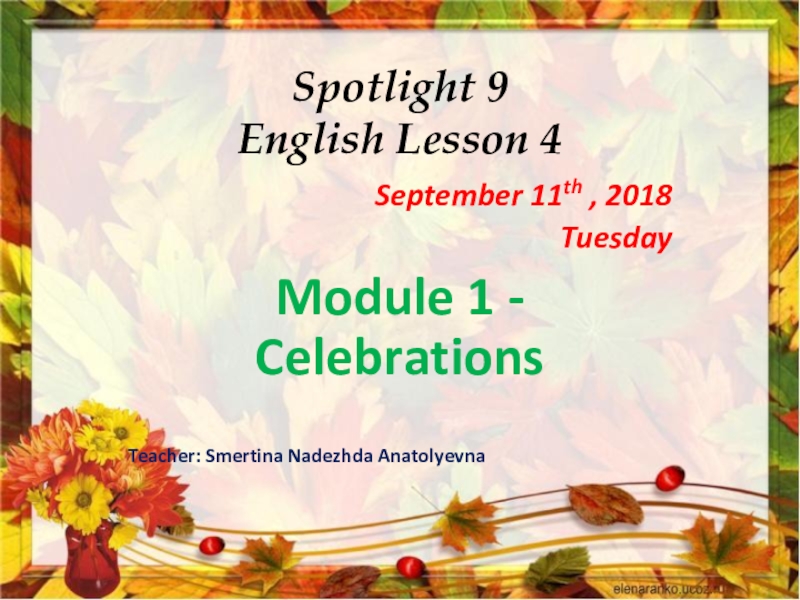
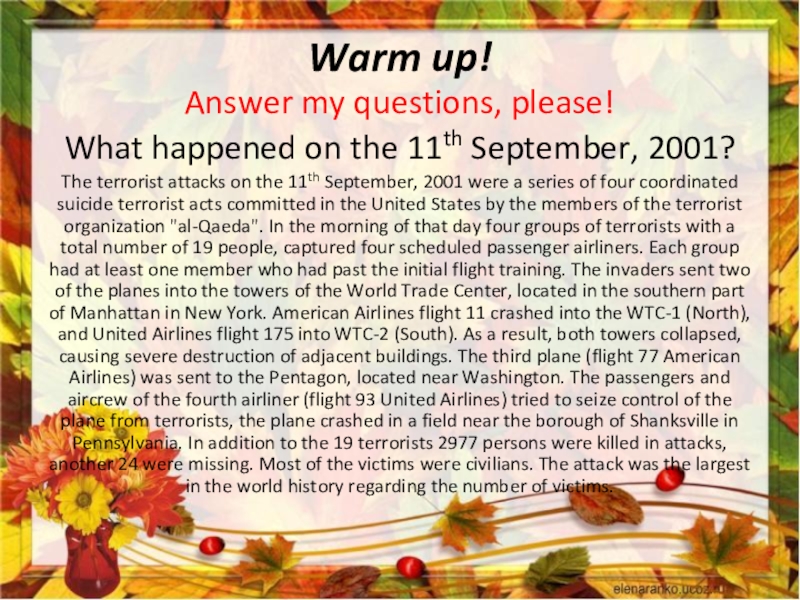
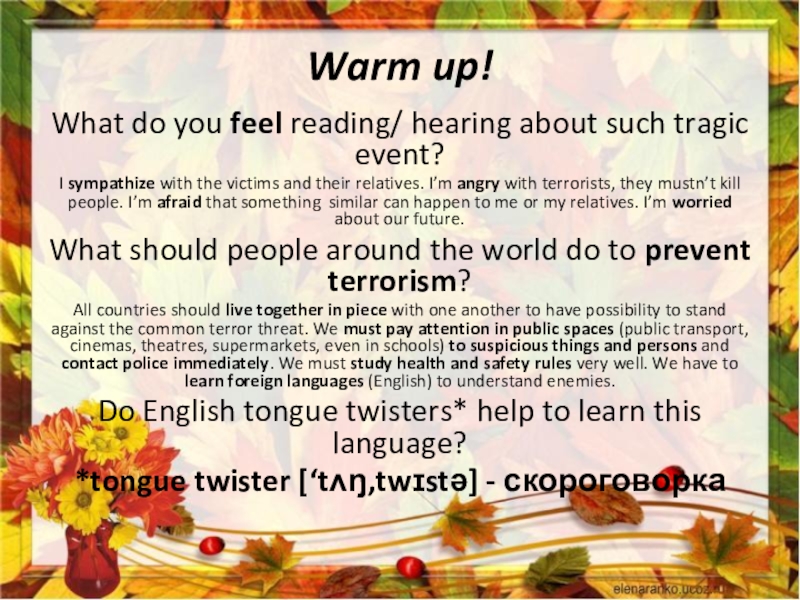
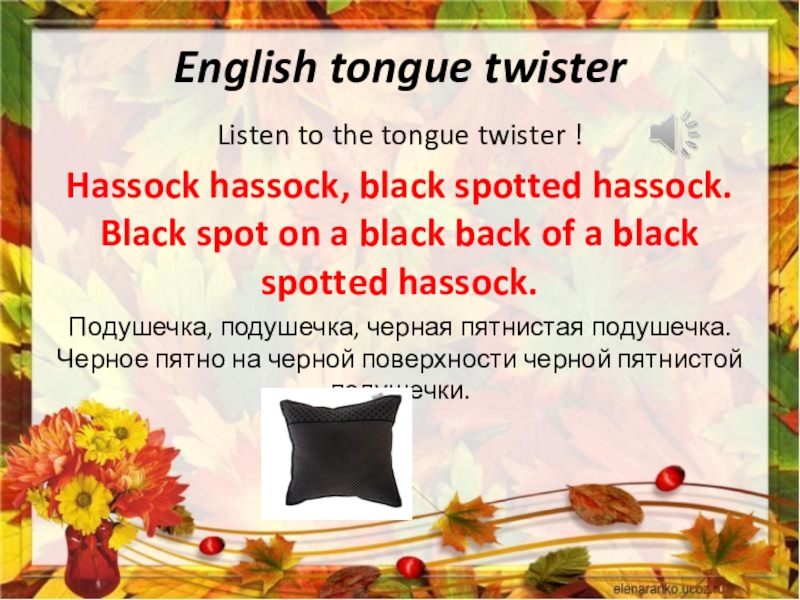
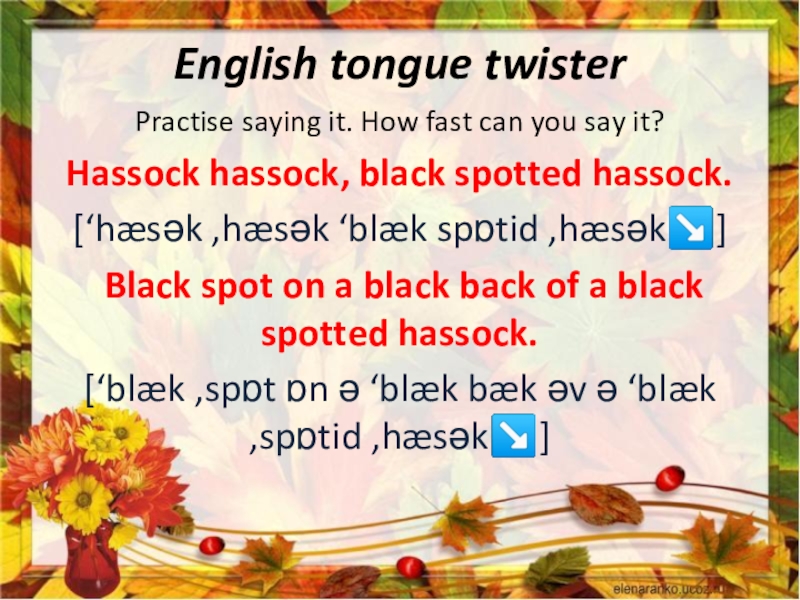
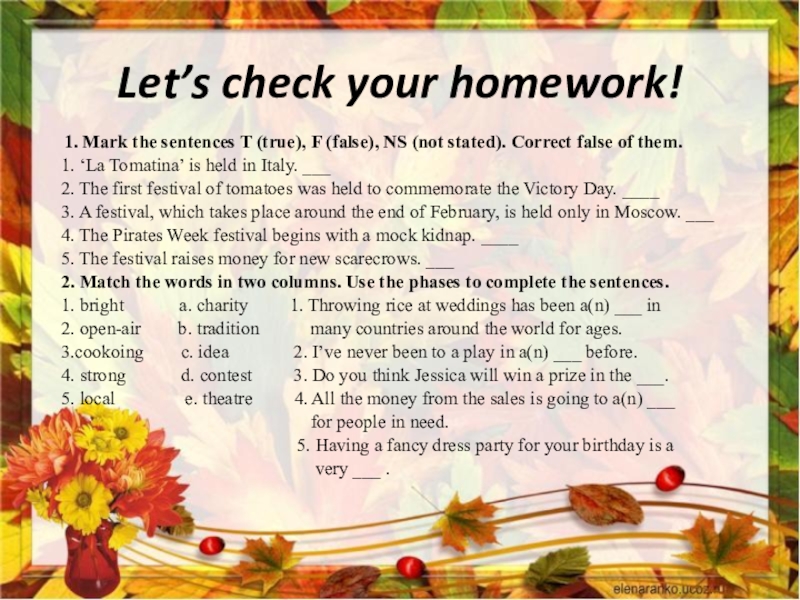
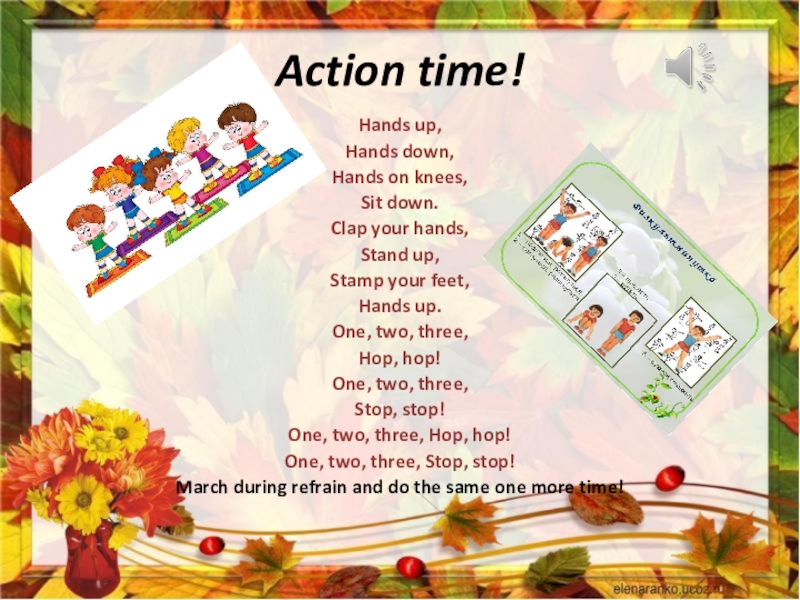
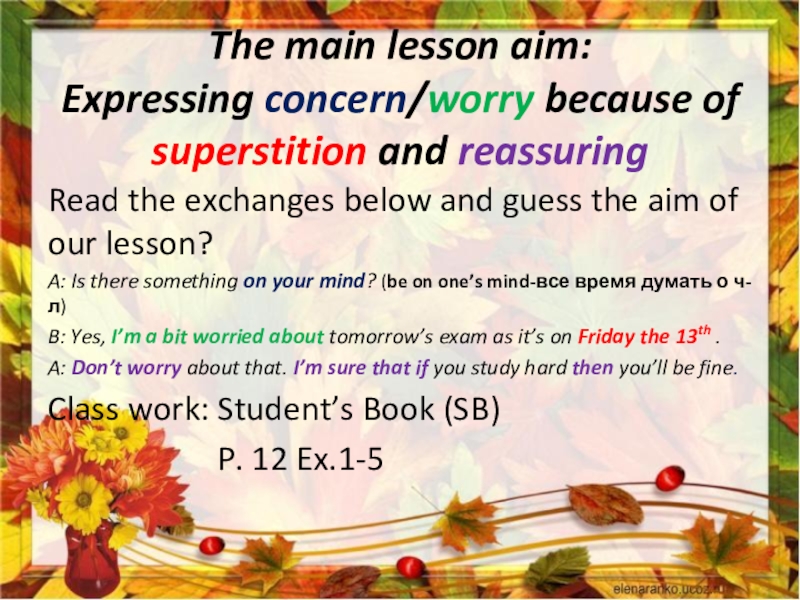
![Презентация по английскому языку на тему Выражение беспокойства из-за примет/ предрассудков для 9 класса New materialVocabularydictionary entry [‘dikʃənəri ‚entri] – словарная статьяattitude [‘ætitju:d] – отношение New materialVocabularydictionary entry [‘dikʃənəri ‚entri] – словарная статьяattitude [‘ætitju:d] – отношение к ч-л, к-лculture [‘kʌltʃə] – культураsuperstitious](/img/tmb/7/696544/922632eac949ed5bf249063d43c9c226-800x.jpg)
